To maintain good health, sleep is essential. Understanding chronotypes can thereby enhance your creativity, productivity, and strength. But what is it exactly?
Depending on one’s age, level of activity, sleeping environment, behaviors, and personality traits each is classified into “Chronotypes”, which are used to categorize these activities.
The quick way to determine your chronotype and comprehend how it affects your life is provided below.
What Is A Chronotype?
The body’s natural tendency to be awake or asleep at specific times is known as a chronotype. Your circadian rhythm, which regulates your body’s sleep-wake cycle, is strongly tied to your chronotype personality.
Chrono refers to time, and type is one of four chronotypes that are categorized that you may be: a lion, dolphin, wolf, or bear. Which one are you? Below is everything explained about it.
Light exposure has the most impact on our circadian cycle, which rises and sets with the sun. This means that melatonin is created more in the evening to help in sleep and less in the morning to support waking up.
Our particular chronotype, unlike our circadian rhythm, is solely determined genetically. This is why, if you want to be as rested and effective as possible, it’s crucial to work with rather than against your chronotype.
The Four Chronotypes: Which One Are You?
The two most popular terms similar to chronotypes are early birds and night owls, but there are mainly four that reveal a person’s ideal schedule based on their internal clock. These chronotypes include wolves, bears, lions, and dolphins.
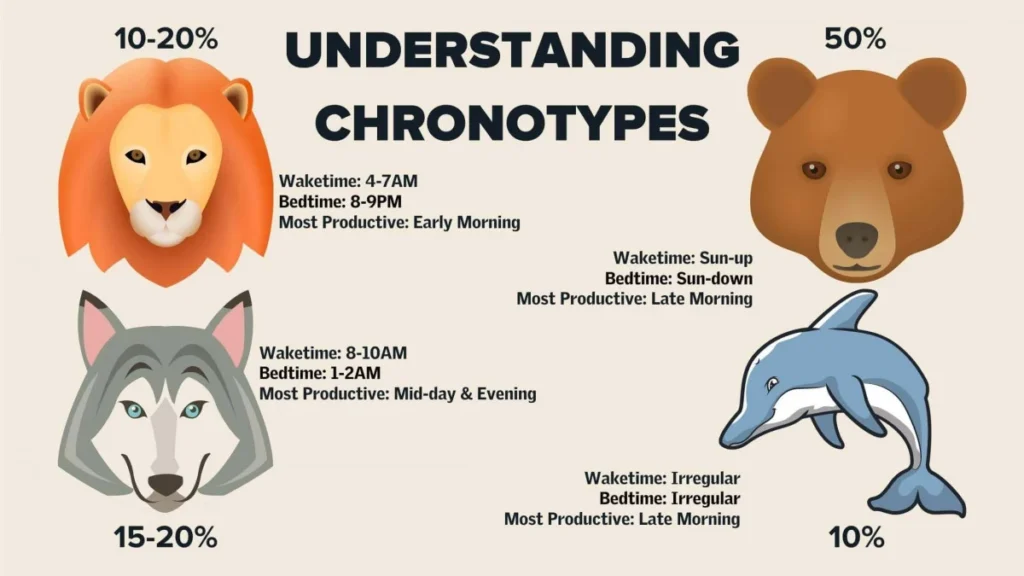
Each of these chronotypes has unique working hours and times that allow them to be most productive. Let’s look at each of these chronotypes and their distinctive characteristics in more detail below.
1. The Bear Chronotype
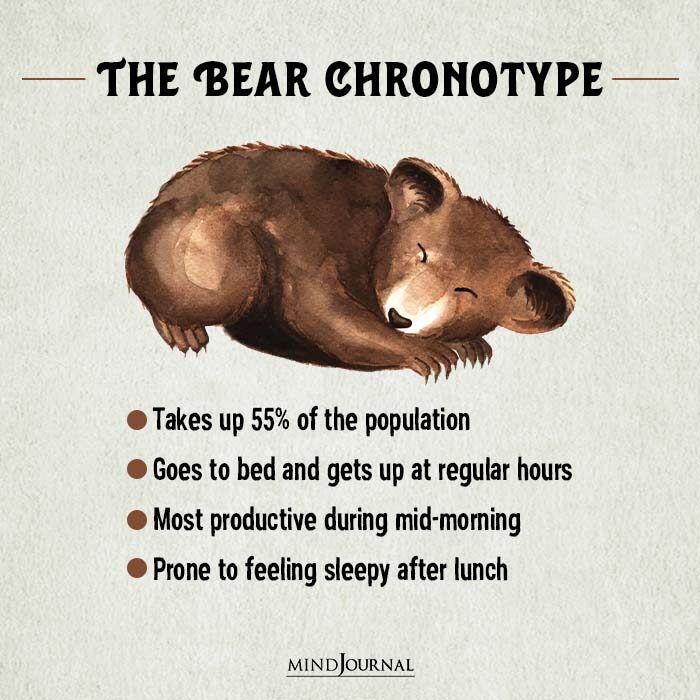
Bears are early risers and they unwind with the sun setting because their sleep-wake cycle is synchronized with the solar cycle.
Did you know that about 55% of people have the Bear chronotype? People with this chronotype often work their hardest before noon, feel their energy level drop in the late afternoon, and start to wind down by early evening and most of the time they get to bed early.
2. The Lion Chronotype
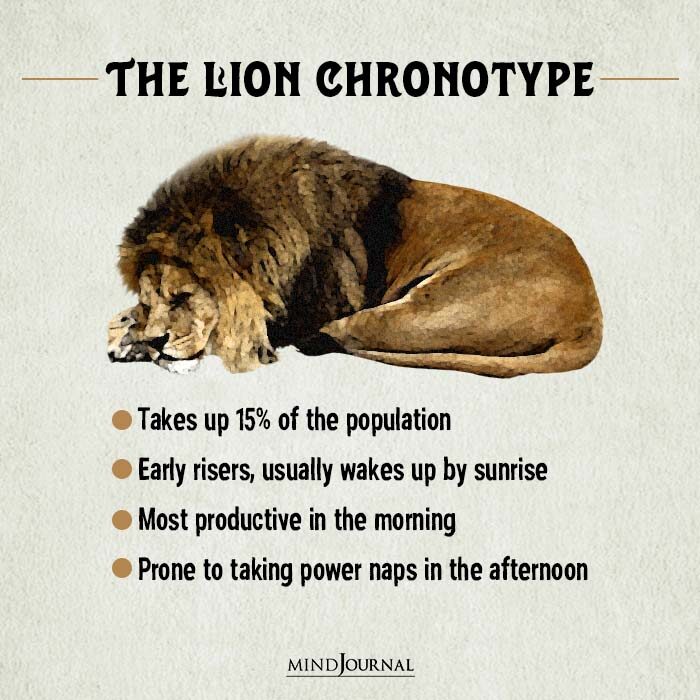
This chronotype might be summed up as “early to bed, early to wake.” Lion chronotypes often get up early and work their hardest in the morning and early afternoon.
When they can begin working on their daily to-do list right away and finish it as quickly as possible, lions perform at their best. Lions have a tendency to go to bed early after relaxing, generally by 9 or 10 PM.
3. The Wolf Chronotype
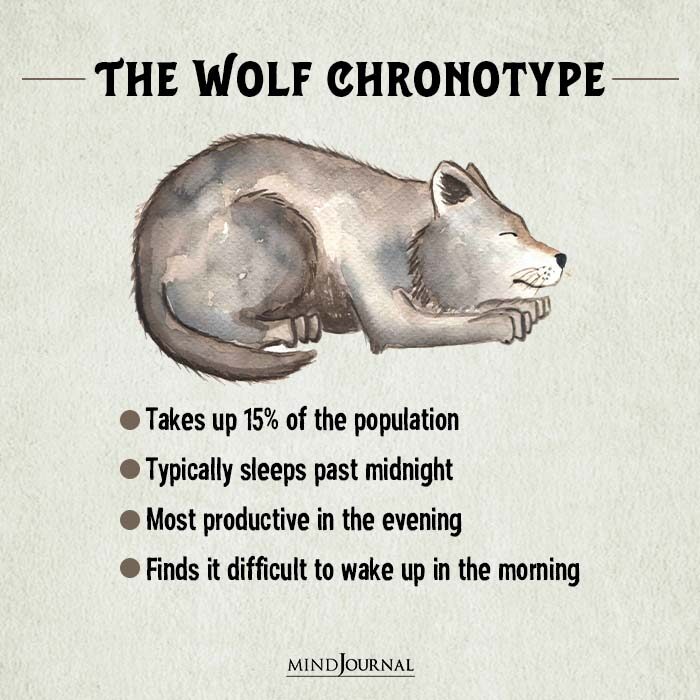
We know someone who is not a morning person. These people almost certainly belong to the Wolf chronotype.
People with the Wolf chronotype are most energetic waking up later in the day. They are most productive between noon and 4 PM and also get boosts of energy during the evening.
4. The Dolphin Chronotype
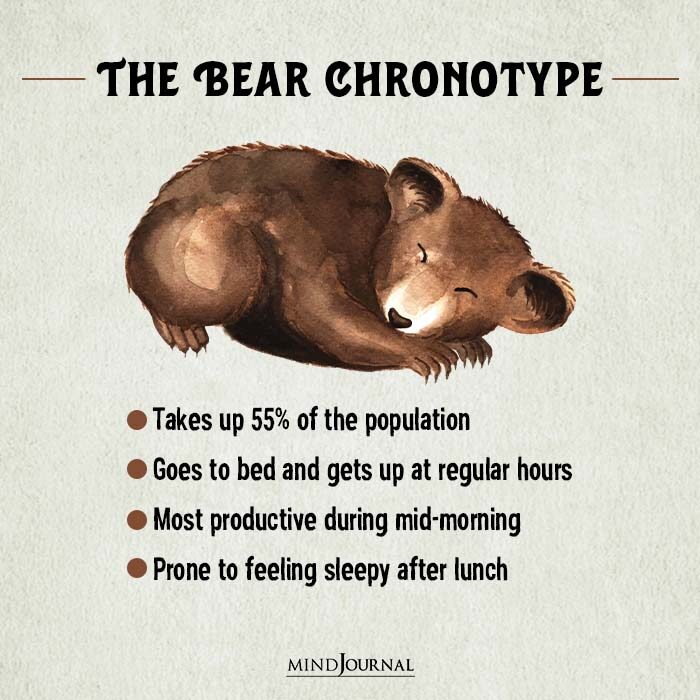
Dolphins are characterized to be highly intelligent, sensitive, and troubled sleepers who are frequently easily startled by noise or light. The fragmented sleep habits of dolphins frequently coincide with insomnia symptoms.
The best time for productivity for people with this chronotype is between the hours of 10 AM and 2 PM each day.
Related: Sleeplessness: 10 Signs, Causes And Tips To Sleep Better
The Chronotype Chart For Productivity And Healthy Living
How to find your chronotype schedule? Well, below is a list of the ideal schedules for each chronotype depending on which of the four chronotypes they belong to.
Ideal daily schedule for bears:
- Wake up: 7 a.m
- Productive hours: 10 a.m. to 2 p.m.
- Lighter tasks: 2 to 4 p.m.
- Relax and unwind – 4 to 9 p.m.
- Get ready for bed: 10 p.m.
- Sleep: 11 p.m.
Ideal daily schedule for lions:
- Wake up: 6 to 7 a.m
- Productive hours: 8 a.m. to 12 p.m.
- Lighter tasks: 12 to 4 p.m.
- Unwind and relax: 5 p.m.
- Get ready for bed: 9 p.m.
- Sleep: 10 p.m
Ideal daily schedule for wolves:
- Wake up: 7:30 to 9.00 a.m.
- Work on lighter tasks: 10 a.m. to 12 p.m.
- Peak hours: 12 to 2 p.m.
- Lighter tasks: 2 to 5 p.m
- Work on lighter tasks: 5 p.m to 8. Pm
- Unwind for the day: 9 to 10 p.m
- Get ready for bed: 10 p.m to 12 a.m
- Go to bed: 12 a.m.
Ideal daily schedule for dolphins:
- Wake up: 6:30 – 7.00 a.m
- Engage in lighter work: 8.00 to 10.00 am
- Peak hours: 10 a.m to 12 p.m.
- Work on lighter tasks: 12.00 to 4.00 pm
- Exercise or other activities: 4.00 to 8.00 pm
- Get ready for bed: 8.00 to 10.00 p.m
- Go to bed: 11:30 p.m.
Related: What Is Body Clock? 12 Ways It Affects Our Health
Benefits of identifying your sleep chronotype animal
Identifying your chronotype can enable you with insight into your sleep and wake cycles, as well as your peak productivity hours.
1. Understanding when you fall asleep
While most people’s bodies naturally create melatonin in the evening and stop doing so in the morning, your chronotype can affect this process and help you choose when you should go to bed.
The quality of your sleep can significantly improve with a regular sleep pattern, so once you know what chronotype you are, stick to the recommended plan.
2. Exercising healthy eating habits
You can keep track of your eating patterns by figuring out and recognizing your chronotype. To give your body enough time to digest and metabolize your food before you go to sleep, it’s important to avoid eating too close to your sleeping time. Otherwise, you can have trouble going to sleep.
For example, evening chronotypes like the wolf are associated with a smaller diet of fruits and vegetables and a higher intake of energy drinks, alcohol, and caffeinated-sugary drinks, which makes it difficult for them to go to sleep early and wake up feeling exhausted.
3. Understanding your mental health and sleep-wake patterns
Even though life can be a little stressful at times, it can be handled differently if you have a schedule in place for when to go to bed, wake up, and at what time to be productive.
According to a review, those who have an evening chronotype tend to have more mental health issues including depression than people who identify as having morning chronotypes. Finding your animal chronotype will therefore enable you to better organize your life.
Related: 8 Surprising Health Benefits Of Sleeping On Your Left Side
So, what is my chronotype?
You can find out more about the types of chronotype and your personality traits by taking this fun quiz.
Now that you know all about chronotypes, which one are you? Write in the comments below.
Frequently Asked Questions (FAQs)
How to determine your chronotype?
Based on the ability to stay awake, and have a certain productivity preference, different people fall into different categories, called “Chronotypes”. You can find out yours in a fun quiz or through schedules created online.
What is my chronotype animal?
Depending on your age, level of activity, sleeping environment, habits, behaviors, and personality traits, you will have your own “Chronotype”. It can either be a dolphin, bear, lion, or wolf.
What is a potential strategy to modify the chronotype?
Sleep regulation, change in eating habits, and understanding your sleep-wake pattern can help you modify your chronotype to a preferred one.
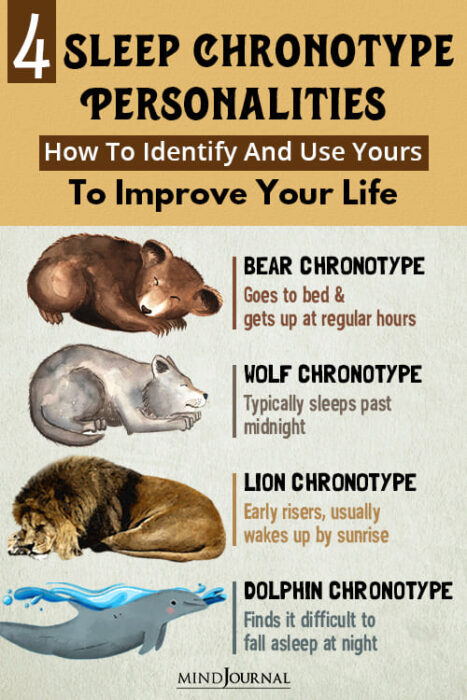
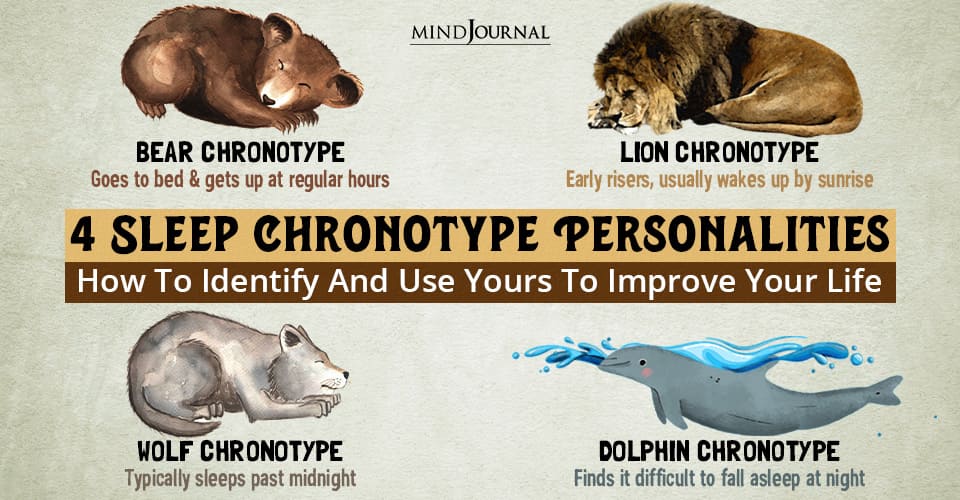


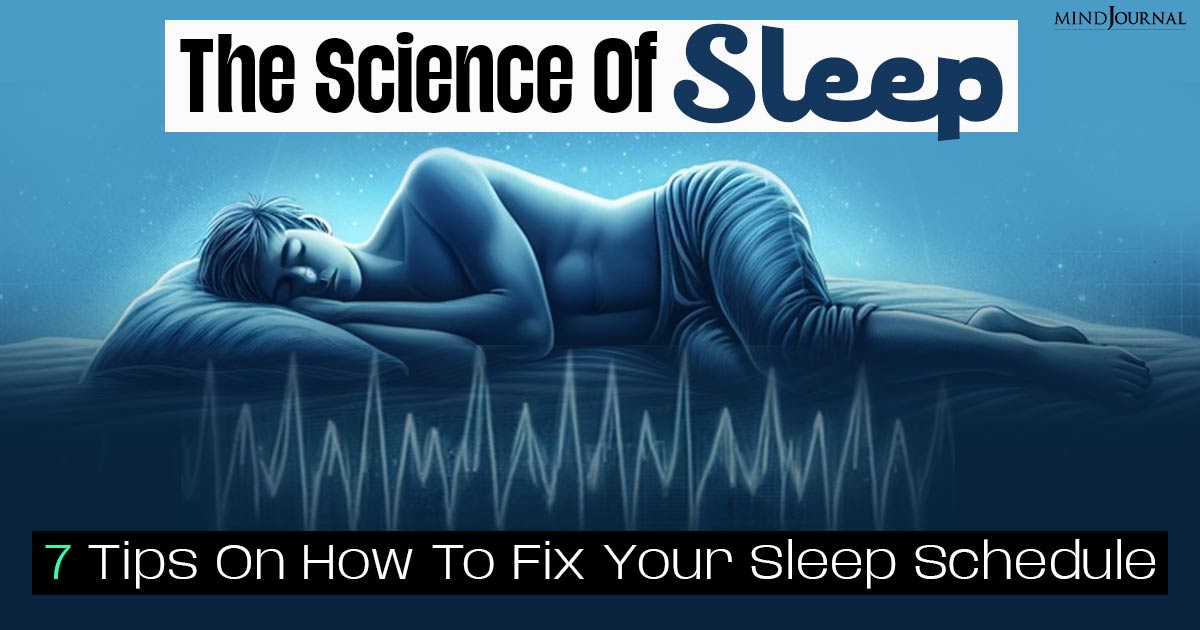
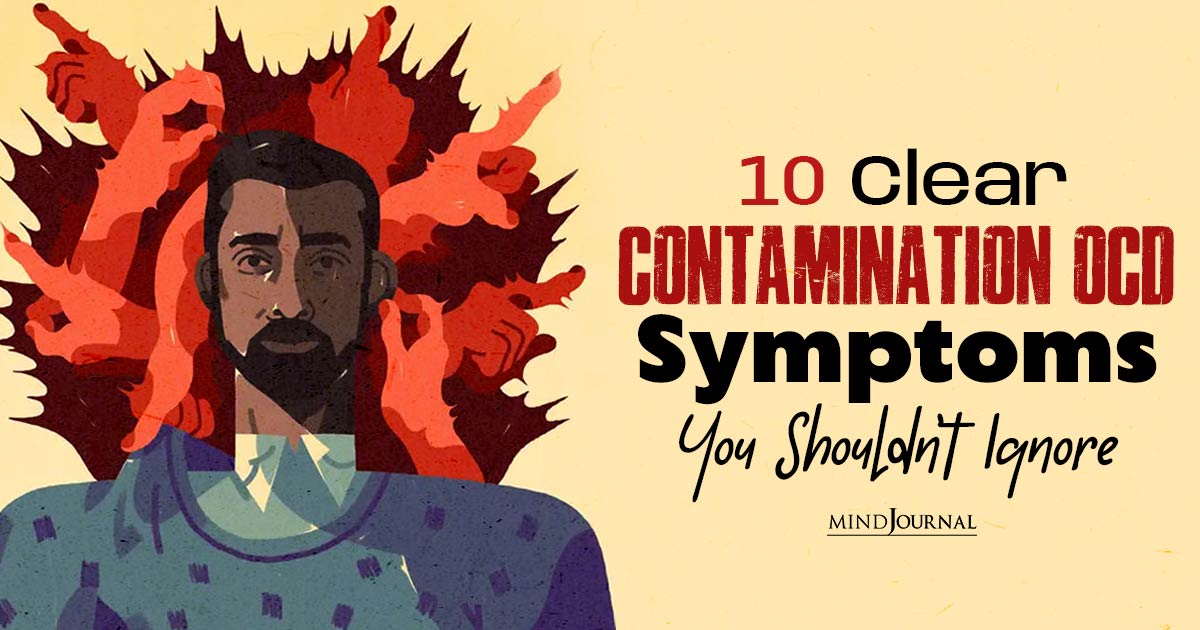

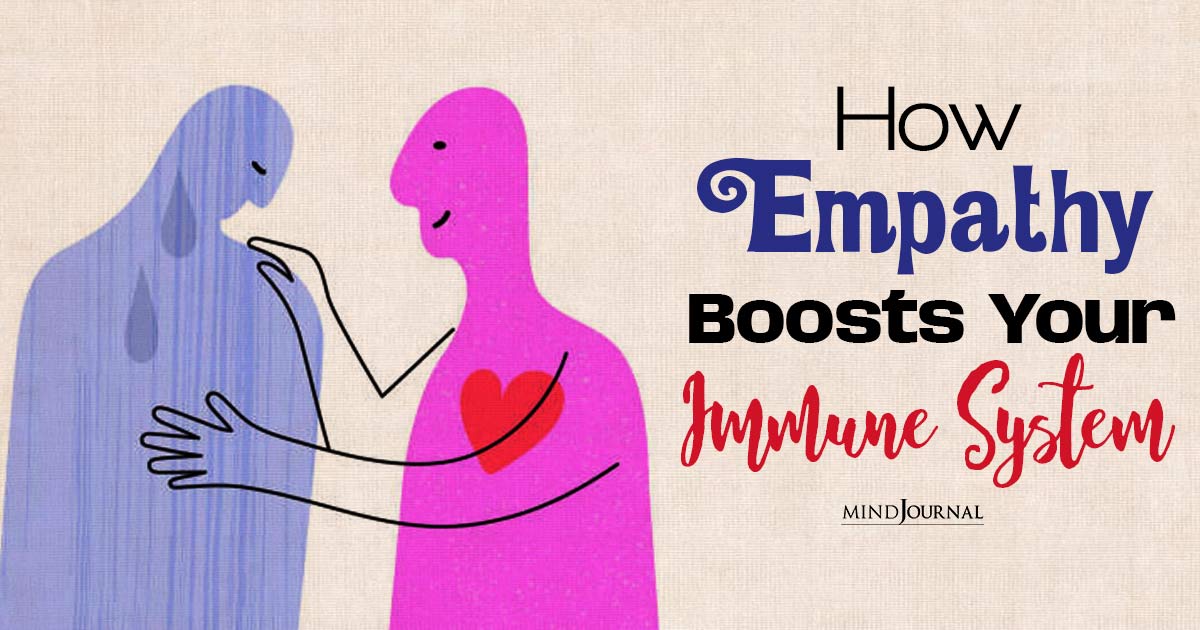
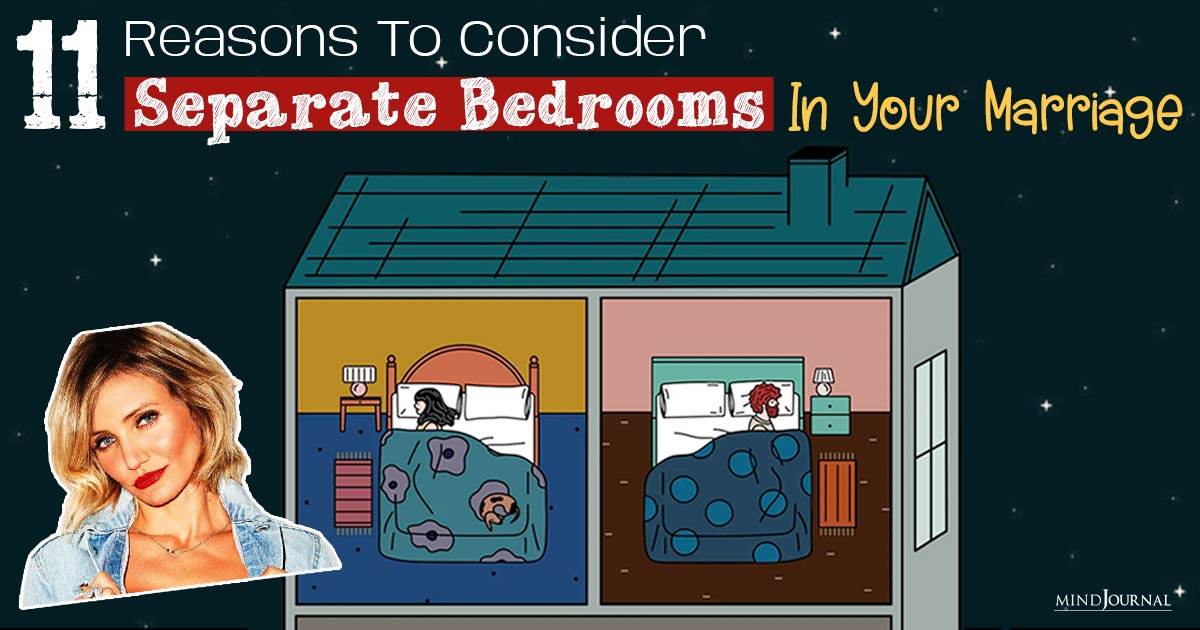
Leave a Reply
You must be logged in to post a comment.